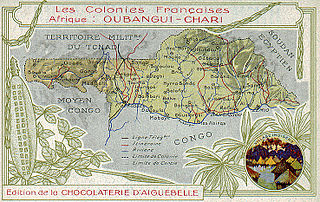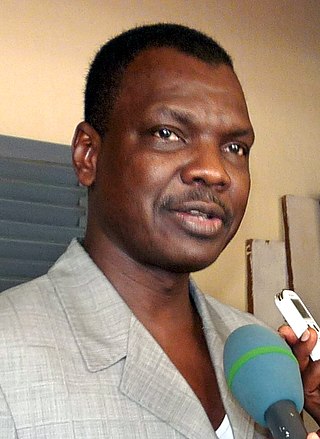| |||||
| Decades: | |||||
|---|---|---|---|---|---|
| See also: | Other events of 2013 History of the Central African Republic | ||||
The following lists events that happened during 2013 in the Central African Republic .
| |||||
| Decades: | |||||
|---|---|---|---|---|---|
| See also: | Other events of 2013 History of the Central African Republic | ||||
The following lists events that happened during 2013 in the Central African Republic .

The history of the Central African Republic is roughly composed of four distinct periods. The earliest period of settlement began around 10,000 years ago when nomadic people first began to settle, farm and fish in the region. The next period began around 10,000 years prior.

The politics of the Central African Republic formally take place in a framework of a semi-presidential republic. In this system, the President is the head of state, with a Prime Minister as head of government. Executive power is exercised by the government. Legislative power is vested in both the government and parliament.
The Central African Armed Forces are the armed forces of the Central African Republic and have been barely functional since the outbreak of the civil war in 2012. Today they are among the world's weakest armed forces, dependent on international support to provide security in the country. In recent years the government has struggled to form a unified national army. It consists of the Ground Force, the gendarmerie, and the National Police.

François Bozizé Yangouvonda is a Central African politician who was President of the Central African Republic from 2003 to 2013. He was the only Central African president born in modern-day Gabon.

The Central African Republic Bush War was a civil war in the Central African Republic which lasted from 2004 to 2007 between Union of Democratic Forces for Unity (UFDR) rebels and government forces. The rebellion began after François Bozizé seized the nation's presidency in 2003. Actual fighting began in 2004. Around 10,000 people were displaced because of the civil unrest.

Michel Am-Nondokro Djotodia is a Central African politician who was President of the Central African Republic from 2013 to 2014. He was the first Muslim to hold that office in the predominantly Christian country. Djotodia was a leader of the almost entirely Muslim Séléka rebel coalition in the December 2012 rebellion against President François Bozizé. Following a peace agreement, Djotodia was appointed to the government as First Deputy Prime Minister for National Defense in February 2013. When the peace agreement unravelled, Séléka captured Bangui and Djotodia took power on 24 March 2013. He promised to lead a transition to new elections in which he would not be a candidate, but his time in office was marked by escalating sectarian violence, and he was ultimately pressured into resigning by regional leaders on 10 January 2014.

Abakar Sabone was the leader of the Movement of Central African Liberators for Justice rebel group during the Central African Republic Bush War.

The Central African Republic Civil War is an ongoing civil war in the Central African Republic (CAR) involving the government, rebels from the Séléka coalition, and Anti-balaka militias.

General elections were held in the Central African Republic on 30 December 2015 to elect the president and National Assembly. As no presidential candidate received more than 50% of the vote, and following the annulling of the results of the National Assembly elections by the Transitional Constitutional Court, a second round of the presidential elections and a re-run of the parliamentary elections were held on 14 February 2016, with second round run-offs for the parliamentary elections on 31 March.

Nicolas Tiangaye is a Central African politician and lawyer who was Prime Minister of the Central African Republic from 17 January 2013 until his resignation on 10 January 2014. He was President of the National Transitional Council from 2003 to 2005.

Séléka CPSK-CPJP-UFDR was an alliance of rebel militia groups that subjugated the Central African Republic (CAR) on 24 March 2013. After its official dissolution in September 2013, the remaining rebel groups became known as Ex-Séléka. Séléka leader Michel Djotodia became the nation's president from March 2013 until his resignation in January 2014. Members of Séléka were almost all Muslim.

An internal conflict in the Central African Republic (CAR) started essentially on 13 April 2013, when the government of President Michel Djotodia officially took over. The fighting was between the government of the Central African Republic's former Séléka coalition of rebel groups, who are mainly from the Muslim minority, and the mainly Christian anti-balaka coalition. The conflict was part of the ongoing Central African Republic Civil War (2012–present). International organisations, such as the United Nations, had warned of a possible genocide. UNSC resolution 2122 authorised the African-led International Support Mission to the Central African Republic (MISCA) to be deployed to the country, and France to lead operations with additional troops sent to bolster its force in the country. Following a summit of Economic Community of Central African States (CEEAC), including the attendance of all the country's MPs, Djotodia resigned from the presidency on 10 January 2014. The National Transitional Council chose Bangui mayor Catherine Samba-Panza as interim president on 20 January 2014. A period of lawlessness prevailed during the early days of her presidency with people moving into religiously cleansed neighbourhoods as the UN warned of a genocide. Anti-Balaka attacks continued against Muslim civilians.

The Anti-balaka (anti-machete) is an alliance of militia groups based in the Central African Republic in the early 21st century said by the Guardian to be composed primarily of Christians, but also some Muslims. However, some church leaders have contested the claimed exclusively Christian character of such groups. The Tony Blair Faith Foundation and journalist Andrew Katz have noted that animists also participate in Anti-balaka groups.

European Union Force RCA, commonly referred as EUFOR RCA, is the United Nations-mandated European Union peacekeeping mission in Bangui, capital of the Central African Republic. The goal of the mission is to stabilize the area after more than a year of internal conflict. Agreement about the mission was reached in January 2014, and the first operations started at the end of April. The mission ended its mandate after nearly a year on 15 March 2015.
A coup d'état occurred in March 2003 in the Central African Republic when the forces of General François Bozizé marched on Bangui, the country's capital, while President Ange-Félix Patassé was attending a regional Community of Sahel–Saharan States leaders' summit in Niger.

Mahamat Kamoun is a Central African politician and financier who served as Acting Prime Minister of the Central African Republic from 10 August 2014 to 2 April 2016. He was the country's first Muslim Prime Minister.

Operation Sangaris was a military intervention of the French military in the Central African Republic, from late 2013 till 2016. It was the seventh French military intervention there since the independence of the country in 1960. On 30 October 2016, France announced it officially ended Operation Sangaris.

Central African Republic–France relations are foreign relations between the Central African Republic (CAR) and France. Both nations are members of the Francophonie and the United Nations.

The following lists events in the year 2012 in the Central African Republic.
The Battle of Bangui occurred in March 2013, during the ongoing Central African Republic Civil War, and resulted in Séléka taking power in the Central African Republic. With the Central African Armed Forces and international soldiers absent, most of the resistance was raised by South African soldiers.